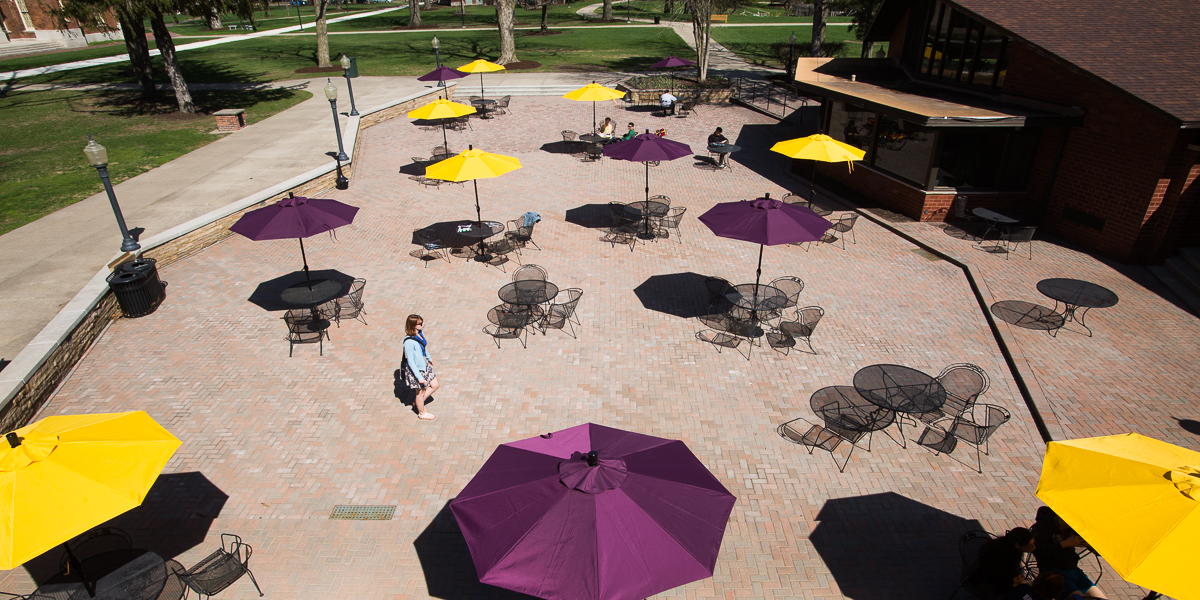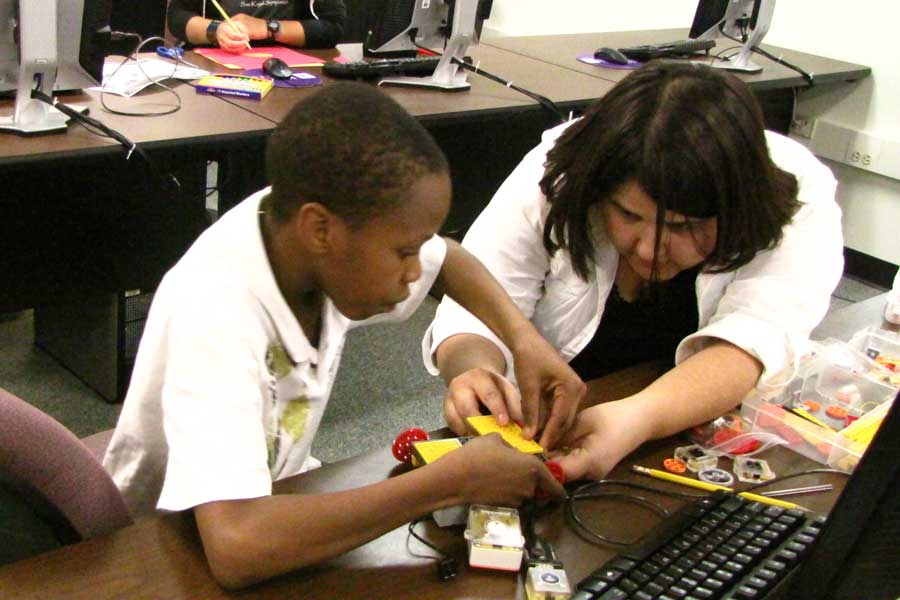Knox Stories
Michael Takeo Magruder Named First Knight Fund Distinguished Artist-in-Residence
Knox College will host its first-ever Knight Fund Distinguished Artist-in-Residence, Michael Takeo Magruder, from September 16 to September 30, 2025
Venture Boldly

Office of Communications
2 East South Street
Galesburg, IL 61401


by Laura Pochodylo ‘14
"See if it drives!"
A boy places a robotic car covered in wires and sensors onto the ground and watches it spin in a circle. He claps above it, and it changes directions. The car approaches shadows and changes directions again.
The middle school boy controlling it looks intently focused, looking away only to review a sequence on the computer screen that guides the car on the ground. After the vehicle tools around for a little bit, a Knox College student gives the boy a high five.
They are partners in the PicoCricket Outreach Program, developed and implemented by Knox College senior Hannah Fidoten for her Honors Project. (Photo at top: Hannah Fidoten, standing, watches as a Knox volunteer helps a younger student with his project.)
"In the program, students use both creativity and logic to do activities that create something that can be good on its own but that can then be combined with robotics to make it interactive," Fidoten said.
Other middle school students trace their hands to draw turkeys, and decide how to animate them with robotics. Meanwhile, Knox students look on and answer questions.
The main focus of the program is the students: middle school students from Galesburg. It is a carefully selected age group, as Fidoten explained.
"There is a national epidemic of students losing interest in STEM (science, technology, engineering, and math) subjects. They most frequently lose interest at the middle school age, so the program targets that age," she said.
Fidoten, a computer science and economics double major, was inspired by her Computer Science Research Seminar class to pursue her project because she read papers about students losing interest in STEM subjects.
Her program uses educational robotics technology based on work by the Lifelong Kindergarten group at the Massachusetts Institute of Technology Media Lab, and her study is based on a similar one at the Georgia Institute of Technology.
The Knox students partnered with the middle school students are all volunteers, and all non-computer science majors. In addition to helping with hands on projects, the Knox volunteers help implement another facet of her project, as well.
"All of the students and volunteers are surveyed at each session to see if their perceptions of computer science have changed," Fidoten said.
The positive personal impact the program has on the students was most gratifying to Fidoten, most of which she heard about on the walk between the Boys & Girls Club and the computer lab on campus.
"It's fun to hear what they like to talk about when they talk about the project between each other," she said.
Fidoten's research project is special in that it combines her work with an element of community outreach. The middle school students were from the Boys & Girls Club.
A member of the service fraternity Alpha Phi Omega (APO), Fidoten utilized the community outreach skills she learned in APO and her fellow members as volunteers to get the program started.
"There are always struggles with getting an outreach program started, but the rewards outweigh the struggles," Fidoten said, adding, "I've gotten so much support from Knox in general, but specifically the computer science department and the Center for Community Service."
In addition to her hands-on educational technology research, Fidoten also conducted a survey of faculty perceptions of computer science.
"There is definitely a stigma associated with computer science and other STEM subjects, and I am looking to break down those negative stereotypes," she said.
In March, she presented a poster on that research at SIGCSE (Special Interest Group on Computer Science Education), the largest computer science education conference, which was held in Raleigh, North Carolina.
"Having a poster accepted was no small feat," Fidoten said. "This year's acceptance rate for posters was 44 percent."
Her faculty perception research will travel even further in July, when she will present a paper at ITiCSE, Innovation and Technology in Computer Science Education, in Israel. Conferences like these, she says, are very important to the computer science field.
"Conference proceedings in computer science are considered the equivalent to peer-reviewed journal entries in other disciplines," Fidoten said.
Her Honors Project advisor, Knox Assistant Professor of Computer Science Jaime Spacco, said he especially enjoyed watching Fidoten field questions from other faculty members when she presented her poster in North Carolina.
"She showed tremendous poise and confidence, and it was just awesome to see," he said. "I was really proud of her."
Fidoten will continue her focus on computer science literacy and education after graduating from Knox, as she plans to work as an AmeriCorps member at the Literacy Coalition in Palm Beach, Florida.
"I may be tutoring individuals or teaching small groups in the schools or at a family literacy center," she said.
In the future, Fidoten, a senior from Cherry Hill, New Jersey, is looking to pursue her interests in educational technology and development of educational games. She credits Knox with the opportunity to explore and research these options in her undergraduate years.
"What is unique about Knox is that if you want to do something, you can find help and support to make it happen," Fidoten said.
Published on May 11, 2012